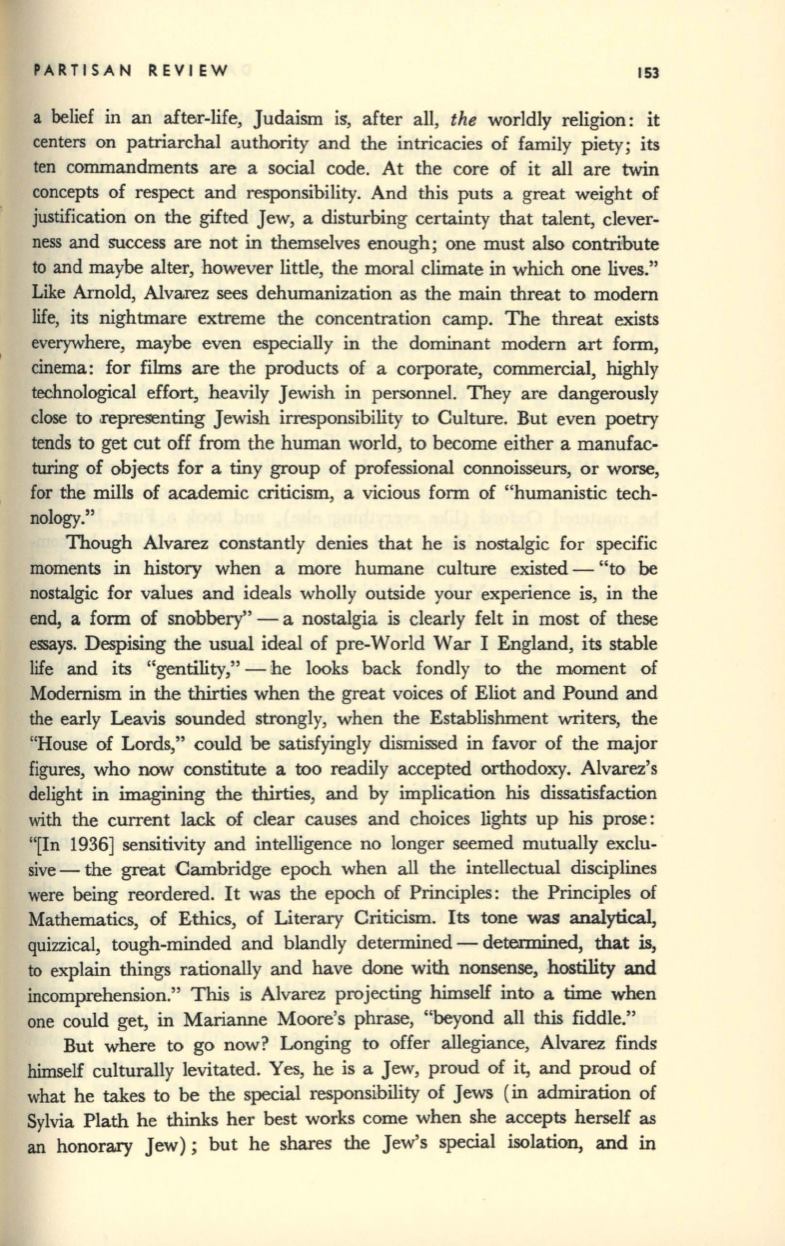
PARTISAN REVIEW
153
a belief in an after-life, Judaism is, after all,
the
worldly religion: it
centers on patriarchal authority and the intricacies of family piety; its
ten commandments are a social code. At the core of it all are twin
concepts of respect and responsibility. And this puts a great weight of
justification on the gifted Jew, a disturbing certainty that talent, clever–
ness and success are not in themselves enough; one must also contribute
to and maybe alter, however little, the moral climate in which one lives."
Like Arnold, Alvarez sees dehumanization as the main threat to modem
life, its nightmare extreme the concentration camp. The threat exists
everywhere, maybe even especially in the dominant modem art form,
cinema: for films are the products of a corporate, commercial, highly
technological effort, heavily Jewish in personnel. They are dangerously
close to I'epres:enting Jewish irresponsibility to Culture. But even poetry
tends to get cut off from the human world, to become either a manufac–
turing of objects for a tiny group of professional connoisseurs, or worse,
for the mills of academic criticism, a vicious form of "humanistic tech–
nology."
Though Alvarez constantly denies that he is nostalgic for specific
moments in history when a more humane culture existed - "to
be
nostalgic for values and ideals wholly outside your experience is, in the
end,
a form of snobbery" - a nostalgia is clearly felt in most of these
essays. Despising the usual ideal of pre-World War I England, its stable
life and its "gentility," - he looks back fondly to the moment of
Modernism in the thirties when the great voices of Eliot and Pound and
the early Leavis sounded strongly, when the Establishment writers, the
"House of Lords," could be satisfyingly dismissed in favor of the major
figures, who now constitute a too readily accepted mthodoxy. Alvarez's
delight in imagining the thirties, and by implication his dissatisfaction
with
the current lack of clear causes and choices lights up his prose:
"[In 1936] sensitivity and intelligence no longer seemed mutually exclu–
sive - the great Cambridge epoch when all the intellectual disciplines
were being reordered.
It
was the epoch of Principles: the Principles of
Mathematics, of Ethics, of Literary Criticism. Its tone
was
analytical,
quizzical, tough-minded and blandly determined - det&mined, that is,
to
explain things rationally and have done with nonsense, hostility and
incomprehension." This is Alvarez projecting himself into a time when
one could get, in Marianne Moore's phrase, "beyond all this fiddle."
But where to go now? Longing to offer allegiance, Alvarez finds
himself culturally levitated. Yes, he is a Jew, proud of it, and proud of
what he takes to be the special responsibility of Jews (in admiration of
Sylvia Plath he thinks her best works come when she accepts herself as
an honorary Jew); but he shares the Jew's special isolation, and in


